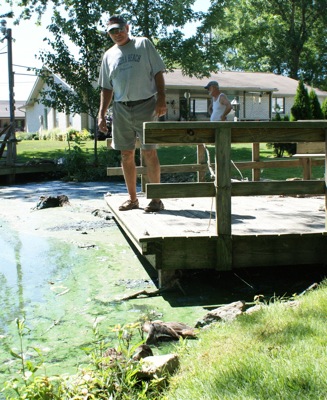Friday, July 2nd, 2010
Algae not blamed directly for death of area waterfowl
Officials: Botulism causes demise; residents frustated with lake problems
By Shelley Grieshop

Photo by Shelley Grieshop/The Daily Standard
Harbor Point resident Mike Muntzinger surveys a dead mallard duck and a dying one near his home. Officials believe some local waterfowl are dying from botulism, an illness that is commonly found in waterfowl across the state and country.
GRAND LAKE - Wildlife experts believe the recent discovery of dead and dying waterfowl in Grand Lake has little to do with the ongoing algae problem.
They believe it's botulism - a disease that spreads easily from bird to bird and kills a small percentage of mallard ducks nearly every year on Grand Lake.
Brett Beatty, an assistant wildlife management supervisor for the Ohio Division of Wildlife in Xenia, believes that is the cause of five mallard ducks and a young goose that were reported either dead or dying this week along a channel in the Harbor Point area east of Celina.
"From everything I'm hearing, it sounds like botulism, textbook botulism," said Beatty, who also is familiar with the severity of the blue-green algae problem at the lake.
The nearly annual botulism outbreak can indirectly be blamed on the algae in the lake. Beatty said it works in a cycle: the algae robs the water of oxygen and subsequently kills some of the fish, which eventually decay and inherit the botulism bacteria. Maggots or other matter that collect on the fish are eaten by the ducks who can become ill and die, he said.
"It's all chained together," he added. "It's really quite normal this time of year."
The botulism could only be dangerous to humans if they ingest the rotting fish or other matter, Beatty said.
Mercer County Wildlife Officer Ryan Garrison retrieved some of the dead and dying waterfowl on Thursday afternoon and planned to take samples for testing. He and Beatty agree the dying fowl exhibited classic signs of botulism - bobbing heads and drooping wings.
A dead mallard duck and two dying ones discovered Thursday morning in the Harbor Point channel appeared to be stuck in the mucky water. Beatty and Garrison speculated the ducks became weak from the illness and floated with the water's current to the area - the same way the blue-green muck arrived.
Several Harbor Point residents were skeptical of the officials' assumption. They suspect the thick, green and awful-smelling algae surrounding the birds was to blame.
Mike Muntzinger, 63, 322 Harbor Point Drive, said he's lived in the private subdivision since 1950 and was shocked to see the ducks perish.
"I'm a lake rat. I grew up on this lake and I've never seen anything like this before," he said as he surveyed the ailing ducks just a few feet away. "This isn't natural."
He and longtime neighbors Dave Muhlenkamp, 66, and Mike Haisley, 71, were quick to blame the ducks' fate on the lake's algae problem - particularly the new species, aphanizomenon, that began to grow this year.
Muntzinger said he's also noticed there are fewer great blue heron near his home. And then there was the odd-looking catfish he caught last week while fishing with Muhlenkamp.
"It was black and had these different parasites and worms sticking out of its mouth and through one eye," he said.
He took pictures last week of the large span of algae scum that bordered his lakefront property.
"It was solid behind my house, way out there," he said pointing to the northeast shoreline. "The smell was somewhere between dead meat and rotten eggs. It was horrible."
A massive algae bloom began about three weeks ago and left blankets of thick and foul-smelling muck in numerous areas around the lake. The problem is the worst along channels and small bays where water is more stagnant.
Various studies on the algae problem have been implemented and new ideas are being discussed. But many residents like Muntzinger feel local officials - although working diligently - cannot solve the problem on their own. And state officials just don't seem to care, he added.
"Honestly, everyone's tired of getting bull-crap from these people," he said. "We'd like to have some answers now."
He recalled a couple down the street who recently arrived at their summer home with their grandchildren. Almost immediately the woman became ill from the algae smell and the family was forced to pack up and leave.
"They said they wouldn't be back until something is done to fix the problem," he said.



